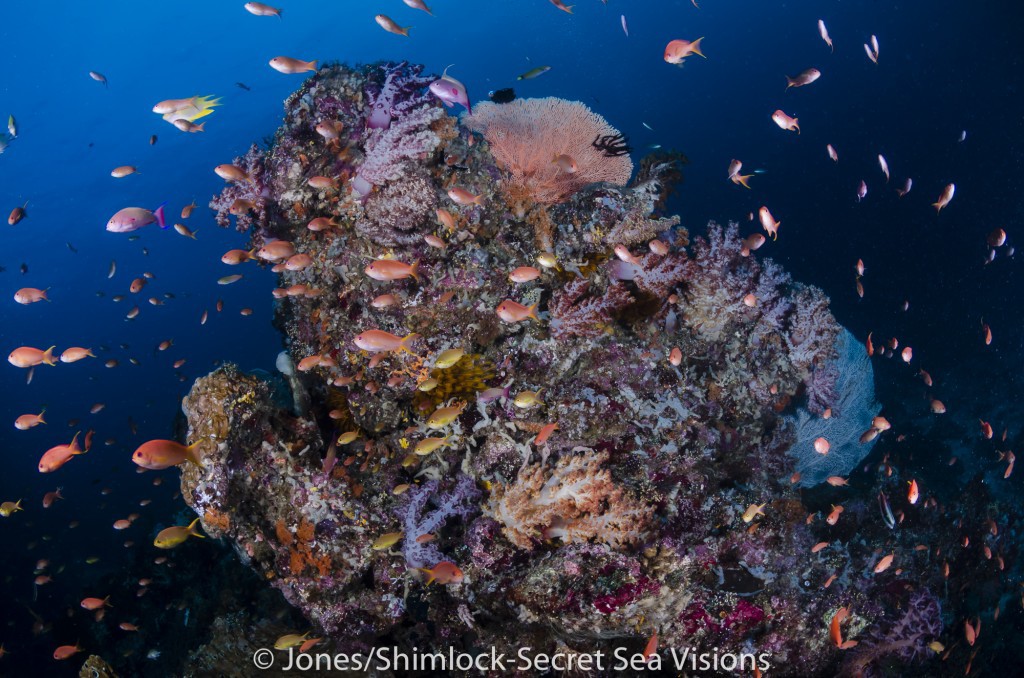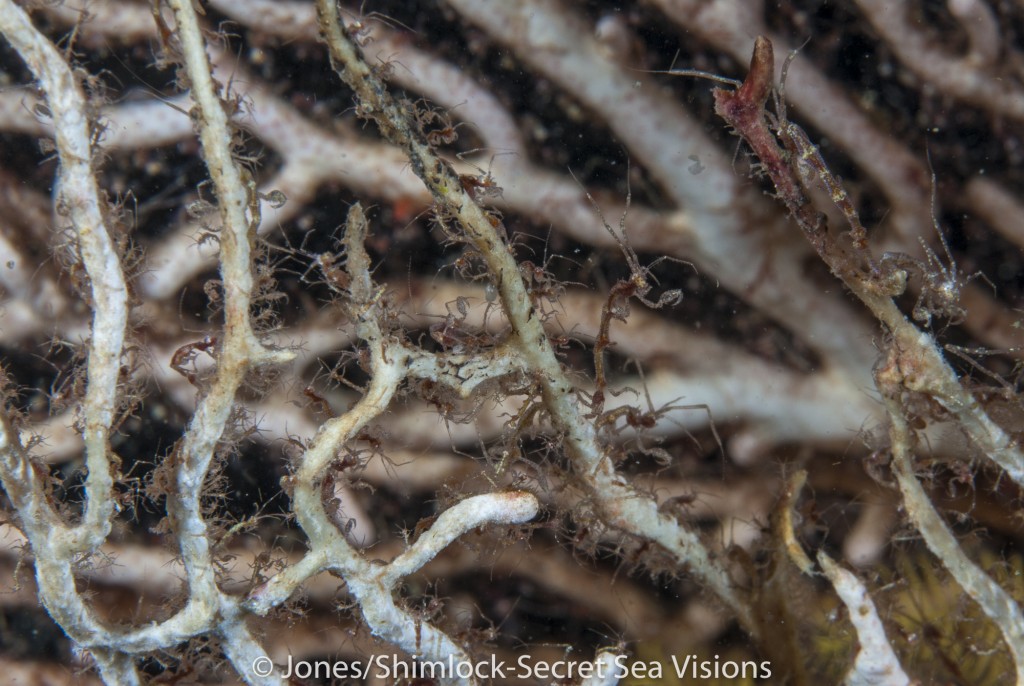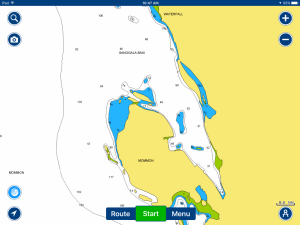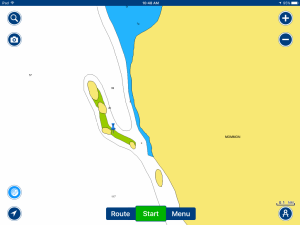News
Beautiful Rock – an amazing new dive site in Mommon, Indonesia

As group leaders specializing in Indonesia and the Bird’s Head Seascape, Maurine and I are always looking for new itineraries and ways to improve our standard trip routes. For a number of years we have led an itinerary that starts in Sorong (Raja Ampat) and ends, or round-trips, in Kaimana (Triton Bay). This journey, however, involves a long, 210 mile, passage between the southern part of Raja (SE Misool) and Triton. Divers, myself included, never want to spend time motoring when they could be diving, so a stop in the Pisang Islands and another near Mommon (halfway between Pisang and Triton) is usually the itinerary we choose. There is an outstanding site in Pisang, plus a couple of others that are good, so this stopover is usually a hit for the long transit day. But until my most recent trip aboard the MV Pindito, the Mommon stopover was, well…other than a visit to the picturesque waterfall…a diving bust!
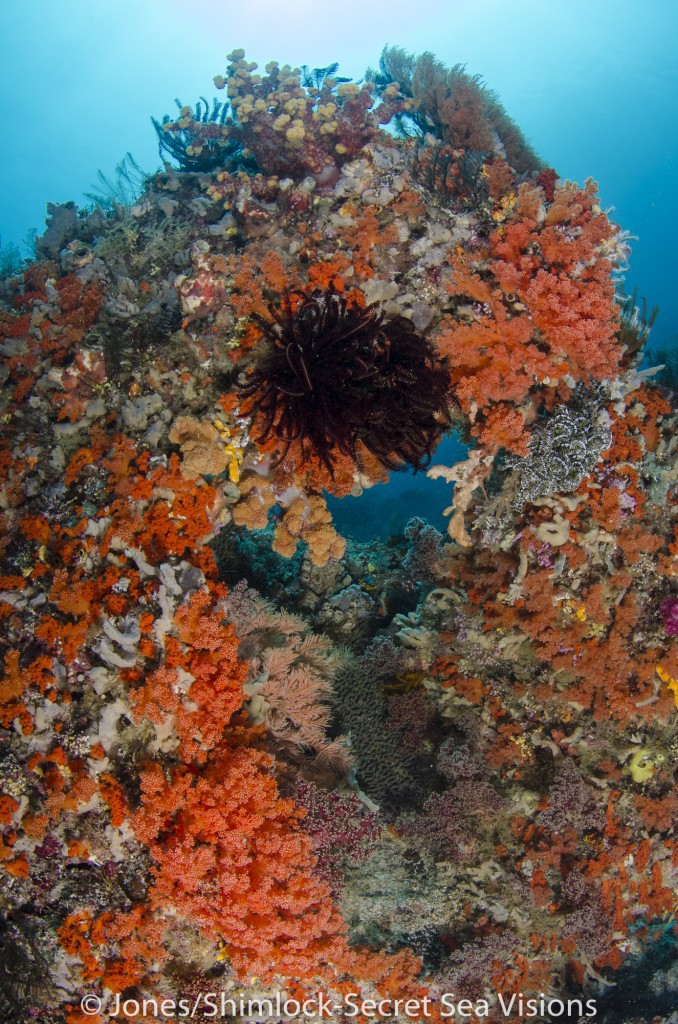 My colleagues at Conservation International suggested that I check out the small islands outside the bay, just west of Mommon peninsula. There are a few islets in the area, so we thought we’d give at least one of them a try, offering an exploratory dive instead of a visit to the waterfall. I have done a LOT of exploratory diving (we specialize in developing new itineraries), but frankly most exploratory dives aren’t very productive, and we try to avoid doing many when we have guests onboard. Now and then, however, we get lucky and uncover a real jewel.
My colleagues at Conservation International suggested that I check out the small islands outside the bay, just west of Mommon peninsula. There are a few islets in the area, so we thought we’d give at least one of them a try, offering an exploratory dive instead of a visit to the waterfall. I have done a LOT of exploratory diving (we specialize in developing new itineraries), but frankly most exploratory dives aren’t very productive, and we try to avoid doing many when we have guests onboard. Now and then, however, we get lucky and uncover a real jewel.
Late last October our group dropped in on Mommon’s outer islands. We chose the southwest corner (ocean side) of the third islet in the four-islet chain. The reef was average at best, comprised mostly of stormed-dwarfed, low profile hard corals. I knew this was no prize, but as we swam east, around the southern tip of the islet and headed back north along the east side into the channel between the islet and Mommon peninsula (the mainland), we began to see a few large, soft-coral covered bommies. The reef was definitely more interesting here. As we continued north along the east or channel side of the islet, we encountered a giant grouper, then spotted an even giant-er one. The site was hot and becoming even hotter as we swam by a series really big soft coral-covered boulders. Draped with glassfish and sweepers, these boulders were nothing short of amazing.
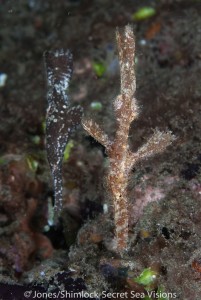 Besides this vibrant reef scene, we also spotted plenty of small stuff to keep the critter fans happy. A reef octopus sitting on a hard coral with a pair of robust ghost pipefish at its base was a delight, as were several nudibranch species. Zillions of skeleton shrimp colonized a single sea fan, and, while the fan’s polyps were retracted, from a distance the shrimp appeared to be extended polyps in feeding mode.
Besides this vibrant reef scene, we also spotted plenty of small stuff to keep the critter fans happy. A reef octopus sitting on a hard coral with a pair of robust ghost pipefish at its base was a delight, as were several nudibranch species. Zillions of skeleton shrimp colonized a single sea fan, and, while the fan’s polyps were retracted, from a distance the shrimp appeared to be extended polyps in feeding mode.
Everyone agreed there was no need for further exploration that day. We, happily, decided to dive the same site again before motoring to Triton Bay. This area begs for more exploration, but for now Mommon has at least one “must stop” dive! The Pindito staff called it simply Batu Cantik (Beautiful Rock)!
GPS: S 03 56.492 E 132 48.229
Burt Jones and his wife Maurine Shimlock have dived extensively in Indonesia and throughout the Bird’s Head. To view more of their work visit their website, Secret Sea Visions.
Gear News
Introducing the TR-80, IR-50 and CS-30 Regulators from DYNAMICNORD

Whether you are a beginner or a professional diver – with the three new main regulators from DYNAMICNORD, everyone will find their favourite regulator. They all look super stylish.
Excellent performance with the TR-80
Quality and performance are the be-all and end-all for regulators. It is not for nothing that the TR stands for Tec Reg. The innovative design of the TR-80 guarantees absolute reliability – even in ice-cold waters.

Perfect breathing effort at 0.8 J/l / certified for diving in waters below 10 degrees / structural design made of solid brass for best cold protection / membrane-compensated design with dry seal of the first stage / reduced exhalation effort thanks to optimized exhalation membrane and bubble deflector / adjustable Venturi (dive/predive) and adjustment knob for individual inhalation comfort / innovative design of the front cover prevents free-flow in strong currents or when diving with scooters / design made of sandblasted brass, matt chrome finish / 2 HP and 4 LP outlets / mouthpiece made of high-quality, anti-allergic silicone for maximum comfort.


Amazing underwater adventures with the IR-50
The IR-50 is the top regulator for advanced and experienced divers. Natural breathing is the essence of this regulator.

Ideal breathing effort at 0.8 J/l /certified for diving in waters below 10 degrees / compensated membrane / adjustable venturi (dive/predive) and adjustment knob for individual inhalation comfort/ outlet valve and deflector for minimum exhalation effort and reduction of bubbles on the face / design made of sandblasted brass, matt chrome finish / 2 HP and 4 NP outlets / mouthpiece made of high-quality, anti-allergic silicone for maximum comfort.


The Workhorse – our CS-30
For diving centres and diving beginners – the workhorse stands for strong construction, reliability and robustness. Perfect for your training.

Optimal breathing effort at 0.8 J/l /recommended for diving in waters above 10 degrees / non-compensated piston / adjustable venturi (dive/predive) / outlet valve and deflector for minimum exhalation effort and reduction of bubbles on the face / design made of sandblasted brass, matt chrome finish / 1 HP and 3 NP outlets / mouthpiece made of high-quality, anti-allergic silicone for maximum comfort.


Octopus OP-30
The OP-30 is the ideal addition to all DYNAMICNORD regulators. It is identical in construction to the CS-30.

The TR-80, IR-50, CS-30 (DIN & INT) regulators and the Octopus OP-30 are available from DYNAMICNORD dealers and in the online store.
DYNAMICNORD – Your Outdoor Companion.
Marine Life & Conservation
Paul Watson Released as Denmark Blocks Japan’s Extradition Bid

Renowned anti-whaling activist Paul Watson has been released from custody in Greenland after spending five months in detention. Denmark’s Justice Ministry rejected Japan’s request for his extradition, citing insufficient guarantees that his time already served in custody would be credited against any potential sentence.
The 74-year-old Canadian-American was arrested on July 21 in Nuuk, Greenland’s capital, when his ship docked to refuel. His arrest was based on a 2012 Japanese warrant related to a 2010 encounter in Antarctic waters. Japan alleged Watson obstructed operations and caused damage to a whaling research ship during efforts to disrupt illegal whaling. Watson has consistently denied these claims, maintaining his commitment to marine conservation.
Denmark, which oversees extradition matters for Greenland, concluded that while the legal conditions for extradition were met, the lack of assurances from Japan regarding time-served credit made extradition untenable.
In a video shared by his foundation, Watson expressed gratitude and relief, saying, “After five months, it’s good to be out… and good to know they’re not sending me to Japan.” He added that the most difficult part of his time in custody was being separated from his two young sons.
Watson is a pioneering figure in marine conservation, known for founding the Captain Paul Watson Foundation in 2022 after decades of activism with the Sea Shepherd Conservation Society. His bold efforts to defend marine life have earned him widespread support, including from celebrities and conservationists. His work has also been featured in the acclaimed reality TV series Whale Wars.
Watson’s lawyer, Jonas Christoffersen, praised the decision, stating, “We are happy and relieved that Paul Watson is now free.” He added that Watson is eager to reunite with his family and continue his vital work.
The arrest occurred while Watson’s vessel, the M/Y John Paul DeJoria, was en route to the North Pacific with a team of 26 volunteers to intercept a Japanese whaling ship. His foundation described the arrest as politically motivated and emphasized that Watson’s actions were focused on ending illegal whaling practices.
Japan resumed commercial whaling in 2019 after leaving the International Whaling Commission, asserting that whale meat is a cultural tradition. Conservationists, however, continue to challenge these practices, highlighting their impact on marine ecosystems.
Despite the challenges, Watson remains steadfast in his mission to protect marine life and bring attention to whaling practices. His dedication to ocean conservation has made him a globally respected advocate for the environment.
-

 News2 months ago
News2 months agoIconic SS United States to become the World’s Largest Artificial Reef
-

 News3 months ago
News3 months agoBook Review – 52 Assignments: Underwater Photography
-

 Gear News3 months ago
Gear News3 months agoDYNAMICNORD – New German diving brand enters the British market
-

 News3 months ago
News3 months agoExploring Cenote El Pit: A Diver’s Dream
-

 Gear News3 months ago
Gear News3 months agoTry BARE drysuits (and maybe even win one!) this Friday with Sea & Sea at North West Dive Fest
-

 Marine Life & Conservation3 months ago
Marine Life & Conservation3 months agoBook Review: Coral Triangle Cameos
-

 Blogs2 months ago
Blogs2 months agoDive the Egyptian Red Sea this Autumn with Regaldive
-

 News3 months ago
News3 months ago2024 Ocean Art Underwater Photo Competition Announced


